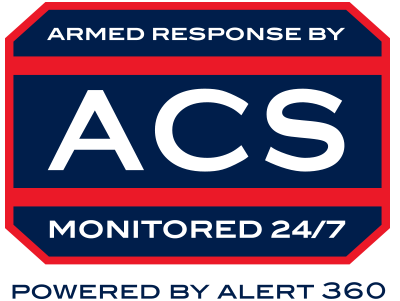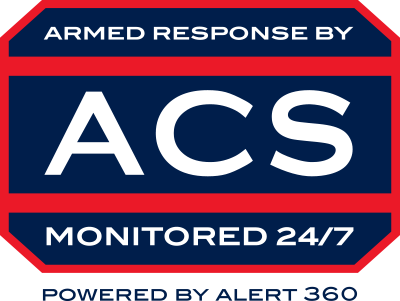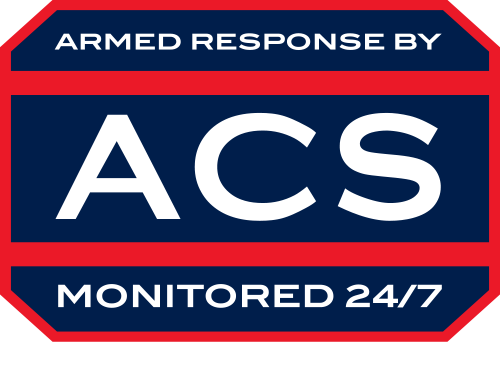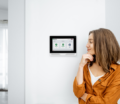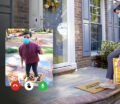Home Safety Tips and Security: A Comprehensive Guide
When it comes to protecting your home and loved ones, knowing where to start can feel overwhelming. Today there are so many options when it comes to security companies, products, and services, it can be hard to tell what’s really worth your time and investment. Which is why we’ve compiled this comprehensive guide of home safety tips and security insight to help you make the right decisions for your situation.
Home Safety Tips: Start With the Basics
We don’t have to dive directly to the home security technology deep end. In fact when it comes to the safety of your family, it’s best to start with the basics. Here are some simple areas of your home to keep in mind as you begin assessing your home security.
Entrances
How many points of entry do you actually have in your home? Consider backdoor or porch areas, garage doors, and even basement entrances when running through your mental checklists.
- Always lock all doors every time you enter and leave.
- Make sure all hinges are functioning properly.
- Change all the locks when you move into a new space.
- Consider adding a video doorbell.
Windows
Windows are your secondary points of entry in the event of a home invasion. But they’re also a great feature of your home that provides natural light and fresh air. Just be sure to remember upkeep like:
- Keep your windows locked at all times if not open or in use. If you open a window for fresh air,
make sure to lock it when you are finished. If windows don’t have locks, install some. - Never leave home with a window open.
- Trim back any trees or shrubs that are near your windows to avoid potential storm damage.
Outdoor Lighting
Remember your space is your own. Which means getting the most from your outdoor spaces as well:
- Keep your front and backyard lit with motion-activated floodlights that can alert you to unwanted guests and deter burglars.
- Trim back any bushes or trees that can block line of sight from a window or door, as well as block light from installed floodlights.
Your Home Alarm
These days there are so many home security options. From DIY security products and full alarm monitoring companies like ACS Security, there’s a plan for protection that fits every lifestyle and budget. If you already work with a security provider, there’s still some regular maintenance to remember on your end:
- Install a home security system. This can include a control panel, motion detectors, glass breaks, smoke & carbon monoxide detectors, and more.
- If you have a security system, be sure to test it regularly.
- If your system is currently running on a landline, consider upgrading to cellular which is more reliable during weather events and more secure.
Home Protection from a Security Provider
There are a lot of home security providers on the market that provide a wide variety of services. If you’re unsure of what to look for in protection, it never hurts to ask questions. As part of our home safety tips guide, here are some questions to consider when shopping for the right company for your needs.
Questions to Ask
How long have you been in business?
Newer companies might not be able to stay around and handle the needs of their customers. Well established companies are going to have systems in place and know how to best help you.
Are there any extra charges? What is the overall cost?
You should know the costs of installation, activation, and monthly monitoring as well as if any rates are subject to increase over time. This will help you understand exactly what you are paying for.
If someone tries to break in, how will your system protect my home?
If the worst-case scenario occurs, you need to know what your security system will do to protect you. What good is a security system that doesn’t respond in any sort of meaningful time, or can’t help protect you and your family? Having a professionally monitored system can add an additional layer of protection and comfort.
Can you share any customer testimonials or successful case studies?
A security salesman will always make it sound like their system is the fastest, most reliable, and best on the market, but customer testimonials and case studies can help you see real facts. If they can’t provide any testimonials, that should be a red flag.
How often does the company check their system?
Regular maintenance checks by the security provider ensure the security system is in perfect working condition. There should be scheduled regular checkups or a maintenance plan option as part of your contract to make sure your system is working as planned.
Do you provide any warranties?
Most companies should offer some type of warranty on their product. Warranties are designed to reduce the risk of financial impact in the unfortunate circumstance there is an equipment failure.
What kind of customer support do you offer?
Make sure if you have any problems you’ll be able to easily reach a qualified customer service representative that can help you.
What happens if I move? Can I take my system with me?
If you love their product, you might want to bring it with you when you move. It’s important to know what their policies are when you move and how that will affect your contract. Even if you can’t move with your equipment, you can be eligible to receive a discount with transferring your service to your new home or even referring the new homeowner to the same company.
Does the system qualify for a home insurance discount?
Depending on your insurance provider, you might qualify for a reduction in your home insurance of up to 20% when you buy a home security system.
What To Expect During Your Home Security Safety Assessment And Installation
Once you decide to purchase a home security system and enroll in alarm monitoring, usually an in-home assessment and installation takes place. During the safety assessment, you can expect a thorough look at the potential hazards in and around your home. This is a great tool to help discover what steps you can take so your home is as safe as possible in any emergency situations.
For the installation of a security system, the process will depend on whether your system is wired or wireless. If you are getting a wired system, in most cases there will be holes made in your wall and sheetrock to install your system. They are needed for the wires, the security control panel, new locks, cameras, and more. For a wireless system, there will typically be less drilling involved. However, there might still be some depending on the system.
Protecting Your System
Most security systems on the market offer the latest in technological advancements. But that doesn’t mean there’s nothing required in upkeep on your end. For one, you can make sure to protect your home security system from hackers. Because most systems rely on your home network and wifi, it’s essential to keep your network password protected. Here are some other internet home safety tips to consider
- Use a private network and hidden SSID.
- Use strong passwords that have at least one special character and a mix of capital and lowercase letters.
- Change your password every 2-3 months.
- Add two-factor authentication.
- Have unique codes for each user of your system.
- An important part of owning a home security system is knowing how to use it. Make sure your entire family is aware of how it works, as well as how to activate and disarm the system.
More Home Safety and Security Tips
Home safety and security is more than just owning a security system. Think of your system as a safety net to protect your home and family from the unexpected, but it’s always important to be mindful of potential dangerous situations that could be around the corner.
Let’s take a closer look at home safety and security issues that can arise – from natural disasters like fires and floods, to more direct threats like burglaries and child safety.
Fire Safety And Prevention
When it comes to fire home safety tips, prevention and planning are your best options. Here are some specific ideas about fire safety you can use in your home. That way in the event of an emergency, everyone under your roof is ready.
Make A Plan
Make a fire emergency plan for your family. As part of this, teach your children to “get low and go” to show them how to get out of the house in case of a fire while avoiding dangerous smoke inhalation. Choose a designated place to meet outside as a family to make sure everyone is safe. Never go back into a building that is on fire and wait for first responders to arrive.
Identify Potential Hazards
Finding potential fire hazards and taking action to address safer use of them can help your entire family and prevent house fires. Some common fire hazards include:
- Damaged electrical equipment
- Candles
- Barbecues, smokers, or grills
- Curtains or towel racks too close to burners in the kitchen
- Space heaters too close to flammable materials
- Dirty or clogged chimneys
Check Fire And Carbon Monoxide Alarms
Make sure you have fire and carbon monoxide alarms installed on every floor of your home. Test them monthly to make sure they are working and replace batteries if needed.
Carbon monoxide can be tricky to understand and is called “the silent killer” because it is a colorless, odorless gas, which makes it very easy to overlook or not recognize in your home. That’s why it’s important to follow these safety tips to keep you and your family protected.
- Don’t warm up a vehicle or leave the engine running in your garage.
- Keep running generators in a well-ventilated area away from your home.
- Never use an oven or stovetop to heat your home.
- Keep fireplaces, furnaces, dryers, and stoves clear of debris before you use them.
- Make sure to have at least one CO alarm in your home. It will act just like a fire alarm, telling you when you are in danger. If it goes off, get outside to get fresh air immediately and call 911.
If you are using a home security company— fire and carbon monoxide alarms should be professionally monitored 24/7 whether or not your home is armed.
Check Your Kitchen
Your kitchen has a lot of potential for smoke, fire, and dangerous conditions. To prevent or reduce the damage of these potential threats in your kitchen, you should:
- Have a fire extinguisher handy and inspect it regularly.
- Don’t leave the oven, stove, or any heating appliance like a toaster oven, unattended.
- Make sure any heating element or burner is turned off when you are done.
- Never use a grill inside or in an enclosed area. Keep propane containers outdoors, upright at all times, and replace if scratched or dented.
Prevent Electrical Fires
Electrical fires can do some serious damage to your home and put your safety at risk. Luckily, electrical fires are almost always preventable in your home. To avoid electrical fires:
- Be careful not to overload your circuit breakers.
- Keep heat-producing appliances unplugged when not in use.
- Only use extension cords for temporary solutions.
- Never use a device with a damaged power cord. If a cord is cracked, frayed, or has come loose from its plug, you should either have it repaired or get a new cord.
Child Safety For When They Are Home Alone
When your kids are old enough, it’s okay to let them stay home alone, but there are still a few tips you can use to make sure they’re safe.
- Make sure they know how to use the monitored alarm system.
- Leave a list of people they can contact in an emergency.
- Check-in on your child regularly.
- Don’t post anything online about them being home alone. Your kids should do the same, and for their safety not post about being alone.
- Tell them to screen calls and only pick up the phone for someone they know.
- They should call 911 immediately if there is an emergency or any suspicious activities around the house. Establish a neighbor or friend’s house they can go to and wait for help.
Burglary Prevention
You can take some of these simple steps to help protect your home against burglary.
- With your home security provider, install glass break sensors, window and door sensors, and establish alerts to help you know when someone has come onto your property.
- Never let strangers into your home or tell them you are home alone.
- Check for legitimate ID cards for people claiming to represent a company and call the company to verify their ID and/or badge number before letting them in the house.
- Hang up immediately if you get a harassing phone call and report it to your police and telephone company.
- Don’t enter your home if you see signs of forced entry. Call 911 immediately.
Home Security and Safety Tips for Vacations
Home security and safety tips matter even when you’re not at home. Maybe even more so since you’re not there to monitor activity and potential emergencies! There are a few easy ways to make sure when you’re out of town and enjoying your vacation that your home stays safe.
- Lock all doors and windows.
- Clear out the mailbox. If you are gone for a longer period of time you can get a friend or family member to check the mail for you or request a temporary mail hold through USPS.
- Use smart devices to create the illusion of someone being home. With smart home devices, you can turn your lights on and off from anywhere.
- Depending on the season and how long you’re away for vacation, set up a way for your yard to be maintained. An overgrown yard or a snow-covered driveway is an easy way to tell no one has been home.
- Turn down the volume on answering machines so people outside can’t hear them.
- Don’t announce your trip online. By sharing travel plans, you’re advertising that your house will be empty. If you have a public profile, anyone can quickly learn you’re away from your home.
- Notify your security company that you will be setting an alarm while you’re out of town. Let them know if you’ll have a house sitter or a neighbor checking in, and give them an up-to-date list of how to contact you on your vacation in case of a security emergency.
SmartHome Automation with ACS Security
Believe it or not, home automation is much more accessible than it used to be. With plenty of direct-to-consumer products created by some of the biggest tech companies today, more and more people are discovering the amazing benefits of home automation.
Interactive home security can do everything from turning your lights on and off and locking your doors, to monitoring your property with video surveillance and adjusting your thermostat, all remotely from your mobile device.
With more convenience can come with it a more relaxed approach to home safety and security. But don’t think of SmartHome integration as an excuse to not have a personal stake in your home and family’s safety. Instead, use these tools to make it even easier to be active and aware of what’s happening with your home security.
For More Security and Home Automation Tips and Solutions, Stick with ACS Security
Knowing where to start with home safety and security can definitely be overwhelming. But if you break it down into smaller steps to make it more manageable, you’ll become a security guru in no time.
And if you’re looking for more ways to keep yourself and your family safe, check out our home security and automation services at ACS Security. We offer a wide range of home security options to protect you and your family. If you’re ready to discuss our custom solutions, contact us today to learn more about our services and how we can help you prepare for what’s next.
